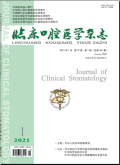临床口腔医学杂志2024,Vol.40Issue(5):281-285,5.DOI:10.3969/j.issn.1003-1634.2024.05.007
牙列缺损患者的睡眠障碍状况及其影响因素研究
Study on sleep disorders and influencing factors in patients with dentition defects
摘要
Abstract
Objective:To understand the sleep disorder of patients with dentition defect,and to explore the influence of the number of missing teeth and dental anxiety factors on the sleep disorder of patients with dentition defect,so as to pro-vide a theoretical basis for preventing and improving the sleep health of patients.Methods:A total of 447 patients with denti-tion defect who were treated in the Department of Prosthodontics of the Affiliated Hospital of North Sichuan Medical College from April 2022 to December 2023 were selected,and the data were analyzed by oral examination and questionnaire survey,and SPSS software.Results:Among the 447 patients surveyed,245(54.8%)had no sleep disorder and 202(45.2%)had sleep disorder.Logistic regression analysis showed that the effects of tooth loss and dental anxiety on sleep disorders in pa-tients with dentition defects were statistically significant(all P<0.05).Compared with 21~28 missing teeth,patients with 1~10 and 11~20 missing teeth had a lower risk of sleep disturbance,with OR(95%CI)of 0.309(0.099,0.968)and 0.235(0.069,0.809),and compared with those with dental anxiety,patients with dentition defect without dental anxiety had a low-er risk of sleep disturbance,with OR(95%CI)of 0.572(0.376,0.868).The results suggested that the loss of 21~28 teeth and dental anxiety were risk factors for sleep disorder in patients with dentition defects.Conclusion:The loss of 21~28 teeth and dental anxiety are risk factors for sleep disorders in patients with dentition defects.Clinicians should pay attention to the timely intervention and guidance of such patients when receiving such patients,so as to improve the sleep health of patients.关键词
牙列缺损/睡眠障碍/牙齿缺失数量/牙科焦虑/问卷调查Key words
Dentition defects/Sleep disorder/Number of missing teeth/Dental anxiety/Questionnaires分类
医药卫生引用本文复制引用
杨姣姣,喻洁,罗家明,朱陶,唐婉容..牙列缺损患者的睡眠障碍状况及其影响因素研究[J].临床口腔医学杂志,2024,40(5):281-285,5.基金项目
南充市校合作课题(19SXHZ0350) (19SXHZ0350)

